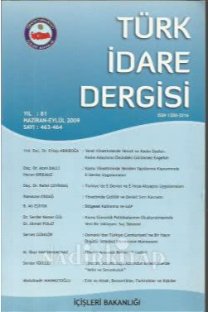KURUMSAL İKTİSADIN TARİHSEL, KAVRAMSAL VE METODOLOJİK BİR DEĞERLENDİRMESİ
A HISTORICAL, CONCEPTUAL AND METHODOLOGICAL EVALUATION OF INSTITUTIONAL ECONOMICS
___
- Adelman, I. (1961). Theories of EconomicGrowthand Development, Stanford UniversityPress, Stanford, California.
- Ankarloo, D. (2002). “The New InstitutionalEconomicsandEconomicHistory”, TheJournal of EconomicHistory, C: 57, No: 3, ss. 718-721.
- Arrow, K. J. (1994). “MethodologicalIndividualismandSocial Knowledge”, TheAmericanEconomicReview, C. 84, No. 2, ss. 1-9.
- Ata, A. Y. (2009). “Kurumsal İktisat Çerçevesinde Yolsuzluğun Fırsat ve Motivasyonları: AB Ülkeleri Üzerine Bir İnceleme”, Çukurova Üniversitesi Sosyal Bilimler Enstitüsü, Yayımlanmamış Doktora Tezi.
- Baş Dinar, G. (2014). “Yeni Kurumsal İktisatta Kurumların Rolü ve İşlevlerine İlişkin Bir Değerlendirme”, Sosyal Bilimler Dergisi/Journal of SocialSciences, C: 8, No: 2, ss. 96-118.
- Bowles, S. (1998). “EndogenousPreferences: TheCulturalConsequences of MarketsandOtherEconomicInstitutions”, Journal of EconomicLiterature, C: 36, No: 1, ss. 75-111.
- Clark, J. M. (1918). “Economicsand Modern Psychology: II”, Journal of PoliticalEconomy, C: 26, ss. 136-166.
- Clark, J. M. (1927). “RecentDevelopments in Economics” in Edward C. Hayes, ed. RecentDevelopments in theSocialSciences. Philadelphia: Lippencott, ss. 213-306.
- Coase, R. H. (1937). “The Nature of theFirm”, Economica, New Series, C: 4, No: 16, ss. 368-405.
- Coase, R. H. (1964). “Discussion of Direct Regulationand Market Performance in theAmericanEconomy”, by Richard E. Cavesand “TheEffectiveness of EconomicRegulation: A Legal View”, byRoger C. Crampton, AmericanEconomicReview, C: 54, ss. 194-197.
- Copeland, M. A. (1951). “InstitutionalEconomicsand Model Analysis”, TheAmericanEconomicReview, C: 41, No: 2, ss. 56-65.
- Dahlman, C. J. (1979). “The Problem of Externality”, Journal of LawandEconomics, C:. 22, No: 1, ss. 141-162.
- Doğaner Gönel, F. (2016). Kalkınma Ekonomisi, 3. Baskı, Efil Yayınevi, Ankara.
- Eggertsson, T. (1990). EconomicBehaviorandInstitutions, Cambridge UniversityPress, Cambridge.
- Hamilton, W. H. (1919). “TheInstitutionalApproachtoEconomicTheory”, TheAmericanEconomicReview, C: 9, No: 1, ss. 309-318.
- Haney, L. H. (1915). HistoryEconomicThought: A CriticialAccount of TheOriginand Development of TheEconomicTheories of TheLeadingThinkers in TheLeading Nations, TheMacmillanCompany, New York, USA.
- Hodgson, G. M. (1998). “TheApproach of InstitutionalEconomics”, Journal of EconomicLiterature, C: 36, No: 1, ss.166-192.
- Kabaş, T. (2017). “19. YY. Osmanlı ve Japon İktisat Düşüncesinin Karşılaştırılması”, Cumhuriyet Üniversitesi İktisadi ve İdari Bilimler Dergisi, C: 18, No: 1, ss. 71-86.
- Kama, Ö. (2011). “Yeni Kurumsal İktisat Okulunun Temelleri”, Gazi Üniversitesi İktisadi ve İdari Bilimler Fakültesi Dergisi, C: 13, No:2, ss. 183-204.
- Kazgan, G. (2000). İktisadi Düşünce veya Politik İktisadın Evrimi, 9. Basım, Remzi Kitapevi, İstanbul.
- Klein, P. G. (1999). “New InstitutionalEconomics”, ss.456-489, Available at SSRN: https://ssrn.com/abstract=115811 or http://dx.doi.org/10.2139/ ssrn.115811.
- Koopmans, T. C. (1947). “MeasurementWithoutTheory”, TheReview of EconomicsandStatistics, C: 29, No: 3, ss. 161-172.
- Küçükkalay, M. (2015). İktisadi Düşünceler Tarihi, Beta Yayınevi, İstanbul. Matur, E. P. (2007). “Kurumsal İktisat Açısından Firma Kuramı”, (Der: Eyüp Özveren). Kurumsal İktisat içinde (s.283-307). İmge Kitabevi, Ankara. Medema, S. G., Mercuro, N. ve Samuels, W. J. (1999).
- InstitutionalLawAndEconomics, InThe Encyclopedia of LawandEconomics, editedbyAldershot: Edward Elgar Publishing, ss. 418-455.
- Oser, J. ve Blanchfield, W. (1975). TheEvolution of EconomicThought, 3rd Edn., HarcourtBrace, New York.
- Özveren, E. (2007). “Kurumsal İktisat: Aralanan Kutu”. (Der: Eyüp Özveren). Kurumsal İktisat içinde (s.15-43). Ankara: İmge Kitabevi.
- Richter, R. (2005). “The New InstitutionalEconomics: Its Start, itsMeaning, itsProspects”, European Business OrganizationLawReview, No: 6, ss. 161-200.
- Rutherford, M. (2001). “AssociationInstitutionalEconomics: ThenandNow”, TheJournal of EconomicPerspectives, C: 15, No: 3, ss. 173-194.
- Savaş, V. F. (1997). İktisadın Tarihi, Liberal Düşünce Topluluğu, İstanbul.
- Şenalp, M.G. (2007). “Dünden Bugüne Kurumsal İktisat”. (Der: Eyüp Özveren). Kurumsal İktisat içinde (ss. 45-92) Ankara: İmge Kitabevi. Veblen, T. (1901). “GustavSchmoller’sEconomics”, TheQuarterlyJournal of Economics, C: 16, No: 1, ss. 69-93.
- Williamson, O. E. (1975). MarketsandHierarchies. Analysis andAntitrustImplications. New York: TheFreePress.
- Williamson, O. E. (1985). TheEconomicInstitutions of Capitalism, New York: FreePress.
- Yılmaz, F. (2007). “Avrupa’da Kurumsal iktisat: G.M.Hodgson Örneği”, (Der: Eyüp Özveren). Kurumsal İktisat içinde (ss. 93-142). Ankara, İmge Kitabevi.
- Yılmaz Genç, S. ve Ekiz, R. (2017), “Kurumsal İktisadi Düşüncenin Terminolojik ve Metodolojik Bir İncelemesi”, (Editörler: Selçuk Koç, Sema Yılmaz Genç, Kerem Çolak), Dünden Bugüne Ekonomi Yazıları içinde (ss. 173-194).
- ISSN: 1300-3216
- Yayın Aralığı: 2
- Başlangıç: 1928
- Yayıncı: İçişleri Bakanlığı
KURUMSAL İKTİSADIN TARİHSEL, KAVRAMSAL VE METODOLOJİK BİR DEĞERLENDİRMESİ
Oytun MEÇİK, Füsun YENİLMEZ, Yahya Can DURA
YAPAY ZEKÂ VE KAMU YÖNETİMİNE YANSIMALARI
Ahmet UÇAR, Sühal ŞEMŞİT, Mehmet Ali YÜKSEL
AVRUPA BİRLİĞİ VE TÜRKİYE ARASINDA GERİ KABUL ANLAŞMASI: VİZE SERBESTİSİ DİYALOĞU DÜĞÜMÜ
KÜRESEL YÖNETİŞİM: KÜRESELLEŞMENİN ZARARLARININ GİDERİLMESİ İÇİN ANAHTAR
Murat BİNAY, Salih Serkan YILDIZ
Erol TURAN, Sevim ÇEVEN, Sefa ÇETİN
KAMU MALİ YÖNETİMİNDE 3 E KURALI
İÇİŞLERİ BAKANLIĞININ YÖNETİM GELENEĞİ
YÖNTEMBİLİMSEL İLKELER BAĞLAMINDA YENİ KAMU YÖNETİMİ VE TÜRKİYE’DE UYGULANABİLİRLİĞİ
